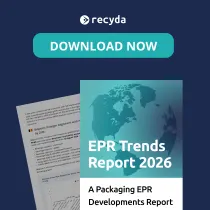Nightmare over? UK Recycling Association applauds Kellogg’s new Pringles tube after previous “fudges”

19 Jul 2023 --- Kellogg’s Pringles is launching a recyclable paper-based tube for its potato chips in Europe in a move that the UK Recycling Association has welcomed as an effective case study for brands struggling to transition away from hard-to-recycle packaging.
After five years of development, Kellogg’s – with support from Belgian waste management partner Fost Plus – has replaced the tube’s steel base with paper, allowing the packaging to be recycled through existing paper and cardboard steams. The cap’s plastic cover can also reportedly be recycled in PMD bags.
The UK Recycling Association previously labeled Pringles’ packaging a “recycler’s nightmare.” The old tube was a complex construction of a foil-lined cardboard sleeve, plastic cap, metal base and metal tear-off lid.

Pringles also teamed up with TerraCycle on a tube recycling scheme in 2018 whereby consumers could post used packaging to waste facilities for conversion into benches and fence posts. Now-retired UK Recycling Association CEO Simon Ellin told us at the time that this scheme was a “fudge that doesn’t solve any issues.”
But the association is encouraged by the new tube: “I applaud the progress made to make the Pringles tube 100% recyclable. Replacing the steel base with paper ensures that the packaging can be recycled easily in paper and cardboard collections,” the association’s new CEO Paul Sanderson tells Packaging Insights.
“Other companies that have difficult-to-recycle packaging can learn from Kellogg’s and the time and effort it has put into solving the difficulty of making packaging recyclable while maintaining the freshness and integrity of the product in it.” The new paper tube is reportedly recyclable in European paper and cardboard waste streams.
The new paper tube is reportedly recyclable in European paper and cardboard waste streams.
Airtight freshness
The new tubes are airtight and, like the old tubes, the chips stay fresh for the intended 15-month shelf life. In the coming years, the packaging will be gradually rolled out to all Pringles’ production lines in Europe.
Kellogg’s Belgian engineering and R&D teams in Mechelen designed new machines that will be installed on all Pringles tube production lines. When the new technology is fully operational, these machines will reportedly be able to produce more than one billion sealed Pringles tubes annually.
The whole project, including the implementation of the new technology, will require an investment of more than €100 million (US$112 million). The production process will be implemented in other Pringles factories following the Belgian rollout.
Trials and tribulations
The new packaging provides a significant boost to Kellog’s commitment to ensuring all of its packaging is 100% reusable, recyclable or compostable by the end of 2025, as part of its ESG Better Days program.
In 2020, Pringles trialed the paper tube with UK supermarket Tesco and conducted in-depth studies to help the brand evaluate consumer responses to the new packaging. High-tech eye-tracking analysis showed how shoppers visually reacted to the tubes on the shelf.
At the time, consumer group Which revealed that two-thirds of branded UK food packaging was unrecyclable in household streams. Pringles was named as the joint-worst offender with Cadbury’s Dairy Milk chocolate bars, Babybel cheese, Capri-Sun juices and Walkers potato chips. Only 3% of packaging in the chips and snacks category was found to be fully recyclable.
“We learned from the test that consumers approve of the new paper tube and we are therefore eager to introduce it to the Belgian market,” says Johan Van Batenburg, director of the Pringles factory in Mechelen. Pringles trialed the new paper tube using eye-tracking analysis, revealing how shoppers visually reacted to the tubes on supermarket shelves.
Pringles trialed the new paper tube using eye-tracking analysis, revealing how shoppers visually reacted to the tubes on supermarket shelves.
Circular economy gains
Kellogg’s expects to prevent 460 tons of waste in Belgium alone through the Pringles packaging redesign.
Wim Geens, managing director at Fost Plus, adds: “The old tube was made of different materials (a paper tube with a metal bottom) that could not be separated by the consumer, making the recycling process difficult.”
“But the new packaging solves this problem. It is important to mention that paper-cardboard is one of the most recycled packaging materials in Belgium: 92% of the packaging in paper-cardboard was recycled in 2021 alone.”
Invented by organic chemist and food storage technician Fredric John Baur, the famous Pringles can has been a defining feature of the product since it launched in 1967 in the US.
By Joshua Poole











